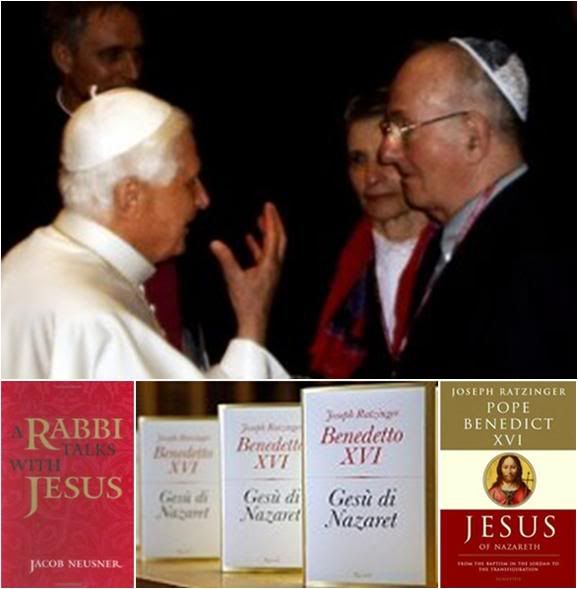After saints, most-quoted author in pope's new book is Rabbi Jacob Neusner
By Cindy Wooden Jewish Ledger Tuesday, May 29, 2007
VATICAN CITY (CNS)-After the Gospel writers and the apostle Paul, the author most quoted in Pope Benedict XVI's new book is Rabbi Jacob Neusner, a U.S. professor of religion and theology.
In his book, "Jesus of Nazareth," released April 16 in Italian, German and Polish, Pope Benedict joined the literary dialogue that Rabbi Neusner invented for himself in his 1993 book, "A Rabbi Talks With Jesus."
The pope said that Rabbi Neusner's "profound respect for the Christian faith and his faithfulness to Judaism led him to seek a dialogue with Jesus."
Imagining himself amid the crowd gathered on a Galilean hillside when Jesus gave his Sermon on the Mount, Rabbi Neusner "listens, confronts and speaks with Jesus himself," the pope wrote.
"In the end, he decides not to follow Jesus," the pope wrote. "He remains faithful to that which he calls the 'eternal Israel.'"
Pope Benedict said Rabbi Neusner makes painfully clear the differences between Christianity and Judaism, but "in a climate of great love: The rabbi accepts the otherness of the message of Jesus and takes his leave with a detachment that knows no hatred."
The pope praised Rabbi Neusner for taking the Gospel of Jesus seriously and, in fact, more seriously than many modern Christian scholars do. Jesus is the Son of God, the unique savior, and not simply a social reformer, a liberal rabbi or the teacher of a new morality, the pope said.
Pope Benedict wrote that in trying to understand who Jesus was and his relationship with his Jewish faith and with the Torah, the law given to Moses, Rabbi Neusner's book "was of great help."
Rabbi Neusner, a prolific author and professor at Bard College in Annandale-on-Hudson, N.Y., told Catholic News Service in Rome that he did not want to talk about the pope's book until he had seen it. The English edition has just been released.
In the introduction to the revised and expanded 2000 edition of his book, Rabbi Neusner wrote, "If I had been in the land of Israel in the first century, I would not have joined the circle of Jesus' disciples. ... If I heard what he said in the Sermon on the Mount, for good and substantive reasons I would not have followed him.
"Where Jesus diverges from the revelation by God to Moses at Mount Sinai, he is wrong and Moses is right," Rabbi Neusner wrote.
In Pope Benedict's treatment of the Sermon on the Mount, 18 of the 25 pages refer to Rabbi Neusner's book.
"More than any of the other interpretations of the Sermon on the Mount with which I am familiar, this debate between a believing Jew and Jesus, son of Abraham, conducted with respect and frankness, opened my eyes to the greatness of the word of Jesus and to the choice the Gospel places before us," the pope wrote.
Austrian Cardinal Christoph Schonborn of Vienna, presenting the pope's book at an April 13 Vatican conference, said reading Rabbi Neusner's book was "one of the reasons" Pope Benedict decided to write his.
"What Pope Benedict says about the book (by Rabbi Neusner) is so essential for understanding his own book about Jesus," the cardinal said.
"More than discussions about exegetical methods" used to understand what the Scriptures say about Jesus, Cardinal Schonborn said, the pope has "at heart the discussion with the rabbi."
"Rabbi Neusner is so important for the book of Joseph Ratzinger/Benedict XVI" precisely because he accepts what Jesus says about himself in the Gospels, the cardinal said.
German Father Joseph Sievers, director of the Cardinal Bea Center for Judaic Studies at the Pontifical Gregorian University in Rome, where Rabbi Neusner has been a guest speaker, said the rabbi "takes very seriously the extraordinary claims of Jesus: He is not just a rabbi teaching the golden rule."
Both Rabbi Neusner and Pope Benedict, Father Sievers said, "have a high Christology," emphasizing the divinity of Christ even if Rabbi Neusner cannot accept Christ's claim.
"(Rabbi) Neusner, even when he spoke here, did not try to find easy solutions or to bridge gaps" between Christians and Jews, Father Sievers said.
In his book, Rabbi Neusner said he hoped to contribute to Christian-Jewish dialogue by taking Christian teaching and Jewish teaching seriously.
"It is one model for a starting point for dialogue -- to recognize differences and not try to make them disappear or to hide them," Father Sievers said.
Father Sievers said Pope Benedict's new book is a further sign that he "is strong on Judaism, he respects it and he knows the contemporary scholarship."
"Basically, he loves a good discussion and so does (Rabbi) Neusner," he said.

No comments:
Post a Comment